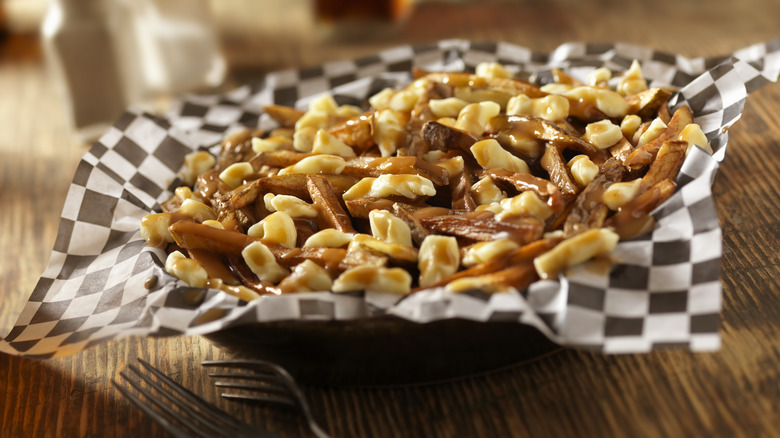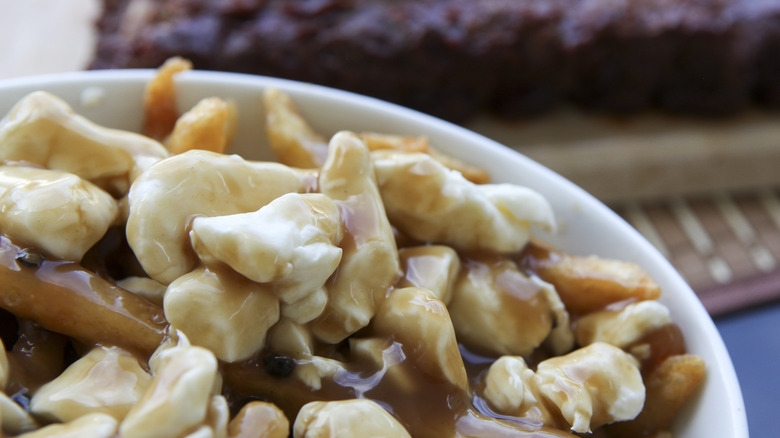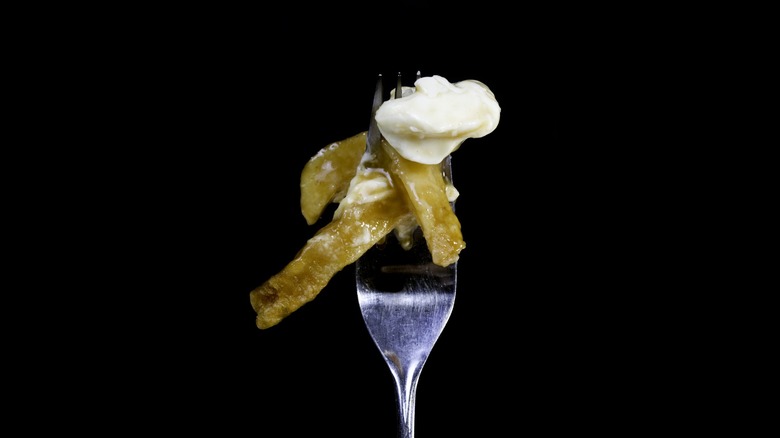How Poutine Became Canada's Most Famous Dish
Canadians have never been known as the loud, grandstanding type, and that might be one of the reasons that their nation's cuisine often flies under the radar internationally. The Great White North is packed with culinary gems, however. It's the world's maple syrup capital and its expansive coasts are home to some of the world's best lobster. For dessert lovers, you'd be hard-pressed to find a better place than the home of beaver tails, Nanaimo bars, and butter tarts. However, if there's one food that Canada has become globally renowned for, it's poutine. Poutine is a glorious heap of French fries topped with squeaky cheese curds and hot beef gravy. It's a simple dish but one deeply imbued with cultural significance.
Poutine hails from the Canadian province of Québec and it serves as a marker of the region's French roots and historical dairy industry. The word "poutine" is a piece of Québécois slang that means "mess" although nobody seems certain whether the food or the slang came first. Others claim that the dish's name is linked to the English "pudding." Today, poutine is internationally known as a Canadian food although the historical tensions between the French and English-speaking portions of Canada have made its status as a national dish somewhat controversial. Poutine's popularity has steadily spread across the globe recently, even producing fast-food poutine versions. The growing number of variations on the dish have only made its cultural status more contentious and more sacred to Québec.
The (probable) origin of poutine
Poutine first appeared in rural Québec around the late-1950s but it's impossible to say who invented it because multiple people have laid claim to the feat. The best-known version of events says that the dish was born in 1957 at Café Ideal in Warwick, Québec. As the story goes, a customer named Eddy Lainesse asked proprietor Fernand Lachance to add cheese curds to his order of French fries. Lachance reportedly said, "Ça va te faire une maudite poutine!" ("That will make a damned mess"). In this story, the slang came first as Lachance agreed to the request.
The story continues to say that other customers began asking for curds with their fries and in the early 1960s, Lachance began serving the mixture on a plate instead of the once-standard paper cones. However, spreading the fries out on a plate made them cool down too quickly so Lachance began ladling gravy on top of it all to keep things warm.
A competing story from nearby Drummondville, Québec, says that Jean-Paul Roy, owner of a drive-in restaurant called Le Roy Jucep, invented poutine. He reportedly began serving a dish called "patate-sauce" which consisted of fries and gravy in 1958. His restaurant also served cheese curds and when he noticed customers adding them to their patate-sauce, he added a new dish to the menu: fromage-patate-sauce. That was simply poutine by another name. It's uncertain which tale, if either, is true.
Poutine politics
For a time, poutine was confined to Québec. It wasn't until the mid-1980s, when a short-lived fast-food chain called Frits started selling poutine across the country that most English-speaking Canadians even tried the stuff. As poutine's popularity has expanded across the country and beyond, many Québécois have objected to their English-speaking countrymen claiming it as a national dish. There are longstanding tensions between Québec and the rest of Canada, complete with calls for Québec's independence continue to this day. Poutine has become a symbol within this tense relationship with Québécois chef Chuck Hughes telling Toronto Life that, "[poutine]'s totally NOT a Canadian dish."
There is also an economic reason that some French-Canadians object to the rest of the country laying claim to poutine. This food has its roots in a rural, lower-income community, and has traditionally been served at late-night eateries to blue-collar folks coming home from a night at the bar. However, for many years, poutine was mocked as a sign of lower economic status and used as a symbol by which English-speaking Canadians would otherize their Québécois counterparts. Consequently, poutine's embrace by Canada at large has been labeled cultural appropriation by some in Québec, continuing to be a point of controversy. Canada may claim the dish now, but one thing is certain; if you want to sample the best of the best, you've got to go to the province where it all began.


